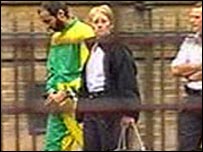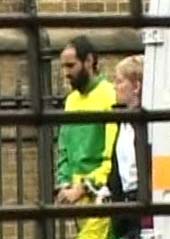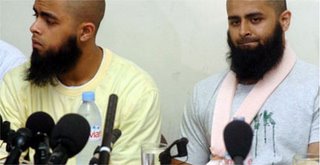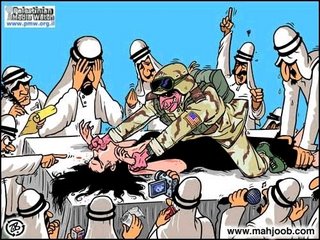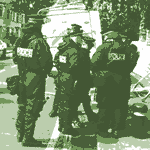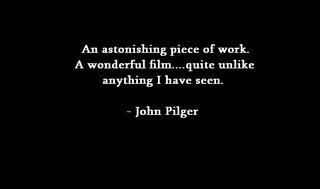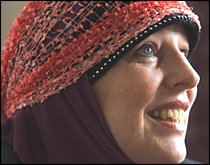Open Letter
From Sami Yusuf to Yvonne Ridley
17/06/06
Dear Yvonne,
Peace and blessings of God be upon you.
Your recent article on 'Pop Culture in the Name of Islam' has been
brought to my attention. I commend you for voicing your opinion and
raising some very important issues – albeit in a very provocative
manner. I thought it would be useful to share some of my thoughts with
you on this matter.
As a Muslim artist, I regularly seek clarification and advice from
world-renowned scholars on art, music, singing and culture. Be
informed that the subject of music is one of the most controversial
topics in Islamic Jurisprudence. I respect those who consider music to
be haram. Yes eminent scholars of our past have opined such. However,
I respect and follow the opinion of other eminent scholars – classical
and contemporary, who permit singing and the use of musical
instruments. The well-established jurisprudential rule states that 'in
matters where there is ikhtilaf (differences of opinion) there is to
be no condemnation of either opinion.' This is from the beauty of the
religion of Islam. The diversity of our cultural, legal and social
traditions is something we are in dire need of celebrating not
condemning. So let's agree to disagree on this one.
The obsessive fascination of fans towards any celebrity - be it in
arts, music, politics, media, etc - to the point of hysteria and
hero-worshipping is definitely unhealthy not to mention un-Islamic. Of
course, as Muslims, we are required to abide by certain etiquettes in
whatever situation we may find ourselves in. However, I definitely did
not see girls dancing or behaving indecently in any of my concerts. To
state otherwise is a gross exaggeration if not an outright fallacy.
And if indeed that did take place then let's deal with it in the true
Prophetic tradition - a tradition that imparts love, mercy, tolerance
and wisdom. Let me share with you the story of the Bedouin who came to
the Prophet's mosque and started urinating in the mosque itself. The
Companions rushed to grab him and give him a 'good beating.' But the
Prophet did not allow them to do so and told them to let him be. After
the Bedouin had urinated, the Prophet asked his Companions to bring a
bucket of water and wash the place. Afterwards he called the man and
with gentleness and affection explained to him that this was a place
of worship and that it should be kept clean. Though I have to say that
had the Bedouin been around today he would be lucky to get away with
just a 'good beating'!
Indeed the state of contemporary mainstream music is one dominated by
celebrity worship, materialism and the constant promotion of a
consumerist culture that seeks only to derive instant emotional and
physical gratification. The arts industry in general – and the music
industry specifically – is being commercialised at the expense of art
itself. We don't value good art or good music anymore – it's about
what can sell most in the market. In the midst of all this, it is upon
all conscious and responsible artists who look beyond the commercial
to work in refining arts and music. Apart from entertaining audiences,
music is a powerful medium to communicate values and social messages.
In these times where heinous crimes against humanity are being
committed, we as artists – Muslims or non-Muslims, British or
non-British – have a duty to use this medium to bring some sanity to
this world of unrest, fear, violence, terror and war. Human life and
dignity are values that should be cherished and championed by all. Had
you listened carefully to the songs in my latest album which is
actually entitled 'My Ummah' before hastily passing judgements, you
would have noticed my modest attempt at addressing issues facing the
global Muslim community – such as regaining our lost legacy in all
spheres of human life, oppression in different parts of the Muslim
world, Aids, landmines, poverty and freedom to wear the hijab.
This leads me to another important issue which you raised – that of
identity and culture. Who are we? How do we define ourselves? What do
we stand for? Let me remind you again – I am a British Muslim. Proud
to be Muslim and proud to be British! Why? Because this is what Islam
teaches me to be – loyal towards my faith and my country. Throughout
our rich history, wherever Muslims settled they adopted and fused the
best aspects of the local culture/society with Islamic teachings and
traditions. As Dr. Umar Faruq Abdallah, a leading American Muslim
scholar and thinker writes in 'Islam the Cultural Imperative':
...In history, Islam showed itself to be culturally friendly and, in
that regard, has been likened to a crystal clear river. Its waters
(Islam) are pure, sweet, and life-giving but—having no color of their
own—reflect the bedrock (indigenous culture) over which they flow. In
China, Islam looked Chinese; in Mali, it looked African. Sustained
cultural relevance to distinct peoples, diverse places, and different
times underlay Islam's long success as a global civilization...
At a time when leading Muslim scholars and thinkers have reached an
advanced stage in crystallising theories of citizenship and positive
integration into Western societies, any discussion of renouncing parts
of our identity is simply ridiculous, dangerous and destructive –
especially for someone who has no other homeland. Such emotional
fist-pumping and chest-pounding about renouncing our British identity
may seem attractive to a minority of Muslim youth, but as Muslims in
positions of influence like yourself, we should not play to these base
instincts. Rather, we should try to be more far-sighted and
responsible in our discourse and not sacrifice this in the pursuit of
tabloid-style sensationalist journalism.
Do you not see the Prophet of Islam shedding tears whilst migrating
from Makkah – his beloved homeland to Madina despite the persecution
he suffered at the hands of its people. Britain is my home. I was
raised here as a child, I went to school here, most of my friends –
Muslims and non-Muslims - are British and my earliest as well as
fondest memories are rooted here. Does being British mean I take pride
in the oppressive and exploitative colonial past of Britain? Does it
mean I support the British invasion of Afghanistan and Iraq? Does it
mean I support the Anti-Terrorism Act? Does it mean I support the
erosion of civil liberties and human rights? Of course not! But
Yvonne, let us be fair and not forget that it was in Britain that the
world witnessed the largest anti-war demonstration – a testimony to
the moral consciousness of the British public. I too was in that
demonstration voicing my discontent over the foreign policies of our
government. Although we have our fair share of racism, Islamophobia,
discrimination, under-representation – and in no way am I claiming
that we live in a utopian society, but I still believe that British
society is amongst the most tolerant, open, liberal, multi-cultural
and inclusive societies in the world. We don't need to go far but
Muslims in the Continent would envy the liberties and opportunities
that British Muslims take for granted. Actually the real debate that
needs to take place is how are we to shape this emerging British /
European / Western Muslim identity and what direction it should take.
I see my work a humble contribution towards that end.
You are critical of my mention that the Metropolitan Police is
inclusive of Muslims. By God, who are you depending on to protect and
safeguard our streets? Yes, there is no doubt that the Metropolitan
Police have committed a series of grave mistakes and blunders – the
recent Forest Gate incident is one such example and the Police must be
held fully accountable for their actions. But we as Britons and
Muslims have a religious and civic obligation to help maintain a safe
and secure Britain. This actually raises serious questions about the
participation of British Muslims not just in the Metropolitan Police
but in mainstream civil society. We have three options as a community:
[1] To assimilate and lose our cultural, ethnic and even religious
roots. [2] To ghettoise and divorce ourselves from society and face
extermination. [3] To positively integrate and contribute to society
whilst remaining loyal to both faith and country. I – like the vast
majority Muslims – have chosen option three. We need to build trust
and partnerships with civil institutions and engage with them. This
path entails that we be active members in our communities and
societies; that we participate at all levels of society from politics
to sports, from academia to arts, from business to media; that we
reserve and exercise the right of dissent and criticism; that we join
our fellow citizens in building a safe, peaceful, tolerant and
pluralistic society that embodies the values of freedom and justice.
Thus I commend you for standing in the last European Elections,
General Elections and the recent Council Elections as a candidate in
order to get your views heard, to make an impact, and to represent
British people – although I hope you have better luck next time.
Positive engagement – not anarchist ranting -– is the path we must
tread.
It is true that the state of the global Muslim community is saddening
but are we meant to live in perpetual grieving and lamenting and dress
in black? Despite all the oppression and persecution suffered by the
Prophet, he would always find time to celebrate the different joyful
moments in life such as marriages, births, Eids and other happy
occasions. He, peace and blessings of God be upon him, also found time
to enjoy poetry and even had appointed a personal poet – the notable
companion Hassan ibn Thabit.
Maintaining balance and adopting the middle way is the key in these
troubled times of ours. Extremism and extremists have no place in
Islam and in our civil societies. "Perished are the extremists" is a
famous Prophetic tradition. Extremism is not a problem unique to
Islam. Every religion, every way of life, every ideology has its
puritans and those willing to distort and misinterpret it to meet
their own agenda. And these are no different to those that commit acts
of terror, who preach extremism, and who sow seeds of hatred in the
name if Islam. There is no denying that Muslims in places like
Palestine, Iraq, Kashmir and Chechnya are facing oppression and
tragedy every day, and both the Muslim world and the West need to come
together to solve these problems in the greater interest of humanity.
Western governments in particular must understand that to help the
majority of Muslims defeat the minority of extremists, they must
assist us in eradicating the daily humiliation faced by Muslims across
many parts of the world. Ending this humiliation is the only way
forward for us.
You have every right to criticise and disagree with me or anyone else
for that matter, and I always welcome any advice and constructive
criticism for I know my defects and shortcomings are many. I am guided
by the ancient wisdom which states 'May God have mercy on the one who
shows me my defects – for that is the best gift he could give me.'
However, in the Islamic tradition there are adab (ethics) of criticism
and disagreement. I know you wrote your article with sincerity and
zeal, but on a more personal level, I was deeply pained and saddened
by the hostile tone and the vulgar style of your language that was
brimming with sarcasm and was clearly un-Islamic, indecent and a gross
violation of the beautiful teachings of our beloved Prophet who said
"I was not sent except to perfect your manners." Using words such as
"astagfirullah dude," "lap-dancing," 'whooping and dancing," and
describing the volunteer stewards as "pipe cleaners" and "bulldozers"
are inappropriate to say the very least. What shocked and even angered
me was the way you shamelessly insulted our pure innocent sisters who
were supporting a charity concert by describing them as "fluffers"!
(Incidentally, these very sisters managed to raise over £100,000 for
orphans all over the world.) I – like the vast majority of those who
read your article – was blissfully ignorant about the very existence
of this disgusting obscene word, and I would question the wisdom of
introducing it to the vocabulary of your readers. As to my
performances, I always consciously endeavour to be responsible,
respectable, modest and dignified on stage.
It has been my approach that whenever personal criticism is levelled
at me I ignore it and get on with my work, as my philosophy in life is
to build and not destroy, and to unite not divide. However, on this
occasion I felt duty-bound to respond because of the dangerous ideas
and notions contained in your article. Yvonne, let us work together as
fellow Muslims and Britons in building a better future for our
community and all human beings and strive to make our world a safer,
more peaceful, tolerant and prosperous place.
Yours faithfully,
Sami Yusuf




